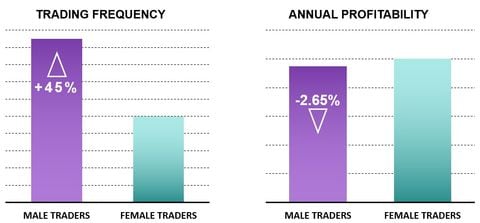Financial markets have been Wolf of Wall Street-style havens in the past, with the investment industry traditionally being very male dominated. There is some debate around whether women trade differently from men, and whether they perform better as a consequence.
Geraldine Weiss, for example, started her own investment advisory newsletter in 1966. She decided to sign it “G. Weiss” in order to avoid the gender discrimination she had experienced while unsuccessfully trying to gain employment at several investment firms.
In the face of this adversity, Weiss went on to become one of the first women to come to prominence in finance, and demonstrated that women could be successful investors. Weiss’ newsletter recommendations have consistently outperformed the market for more than 30 years1.
In the last 50 or so years, the number of female traders has begun to rise. With this change there has been greater research into, and understanding of, the fundamental differences between male and female trading behaviour and instrument selection. Some investors have identified characteristics which they describe as ‘a female approach to trading’, and there is a growing argument that these characteristics have several benefits.
The over-confidence factor
Take the paper ’Boys Will Be Boys: Gender, Overconfidence, and Common Stock Investment‘ by University of California, Davis, and University of California, Berkeley academics Brad Barber and Terrance Odean. Initially published in the late 1990s, it describes their study of 35,000 accounts at a large discount brokerage company.
Among their findings, they determined that men trade with a 45% higher frequency than women, but with a reduction in net returns of 2.65% per annum. From this they deduced the less a person trades, the more likely they are to do well2.

The higher-frequency trading pattern shown by men was attributed to overconfidence. If men have a stronger belief in their own assessments of the markets, this is likely to lead to an increase in trading activity. Overconfidence in knowledge and ability could lead them to impulsively take greater risks, without looking at the bigger picture.
Women, by investing less frequently and holding positions for longer, often create greater financial return. They are more likely to deliberate before placing a trade, and don’t enter until their belief in the trade is high, often waiting for several price dips before buying. Generally, women don’t take sub-optimal setups as often as men do, so tend to have a higher winning percentage. Few influential male traders take such a cautious approach, although Warren Buffet is an outlier well known for his long-term holding strategies.
Admitting mistakes
The age-old adage that men will not stop to ask for directions when lost sometimes rings true in trading. A refusal to admit when they are wrong could mean they are more likely to hold on to losing trades longer than they should, in the hope that they will turn around. Women generally tend to admit mistakes more quickly, and are more willing to ask questions when confronted with things they don’t understand. This means they tend to adhere to a strategy more strictly and are better at cutting losses.
Staying cool under pressure
It has been suggested that women act more sensibly on volatile days, with men more likely to panic and sell positions after large market drops or ‘corrections’. This means locking in losses, while women are more likely to hold and give the markets a chance to recover. In 2015, Catherine Eckel and Sascha Fullbrunn found that in experimental asset markets, male-dominated markets generated bigger speculative bubbles than female-dominated ones3. Female trading behaviour, often associated with patience and analytics, offers a stabilising impact on capital markets as their positions may balance a sell-off.
Avoiding risk
Conserving capital is essential in trading, and the available data suggests that women tend to be more risk-averse than men. They trade less often and execute strategies that are less extreme. This can be a double-edged sword, however, as being too conservative can result in lower returns.
Female traders may also be more likely to hold a small, concentrated portfolio (Weiss herself advocated a relatively focused portfolio, suggesting that investors should not hold more than 10-20 stocks). This can allow for better management of trades with fewer areas to watch.
Setting goals
Men are considered by some researchers to be more competitive, whereas women might avoid getting caught up in the adrenaline rush of the moment, and focus instead on their eventual spending goals. In a male-dominated arena, women who choose a career in trading are still in a minority, and can therefore be more determined to succeed. This could include dedicating time to practising strategies and finding a mentor whose advice they feel comfortable heeding.
In terms of using these themes to improve your own trading, the take-home message seems to be: take fewer, high quality/high probability trades; don’t hold on to losing positions; and, have a trading plan which you stick to.
Sources
1. https://moneyweek.com/475126/the-worlds-greatest-investors-5/
2. https://papers.ssrn.com/sol3/papers.cfm?abstract_id=139415
3. https://www.aeaweb.org/articles?id=10.1257/aer.20130683
Disclaimer
CMC Markets is an execution-only service provider. The material (whether or not it states any opinions) is for general information purposes only, and does not take into account your personal circumstances or objectives. Nothing in this material is (or should be considered to be) financial, investment or other advice on which reliance should be placed. No opinion given in the material constitutes a recommendation by CMC Markets or the author that any particular investment, security, transaction or investment strategy is suitable for any specific person.
CMC Markets does not endorse or offer opinion on the trading strategies used by the author. Their trading strategies do not guarantee any return and CMC Markets shall not be held responsible for any loss that you may incur, either directly or indirectly, arising from any investment based on any information contained herein.
















